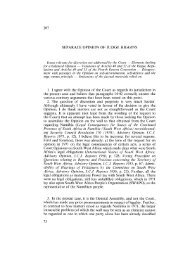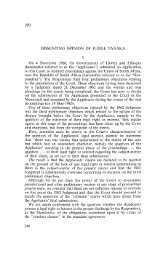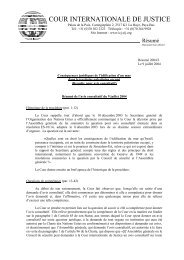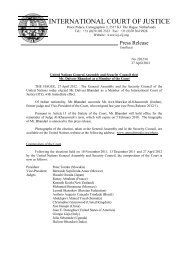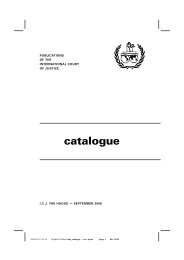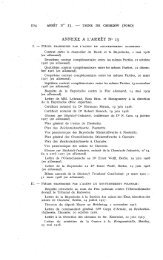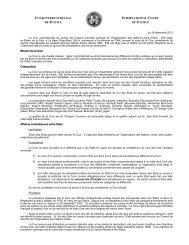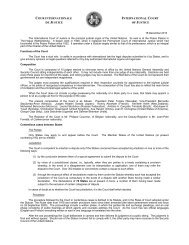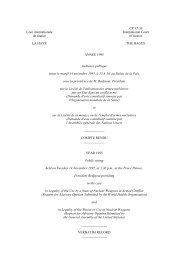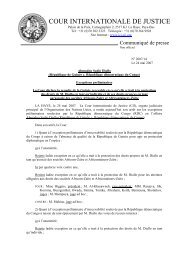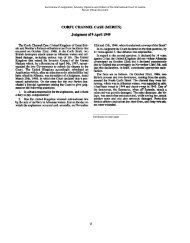botswana/namibia - Cour international de Justice
botswana/namibia - Cour international de Justice
botswana/namibia - Cour international de Justice
You also want an ePaper? Increase the reach of your titles
YUMPU automatically turns print PDFs into web optimized ePapers that Google loves.
706. The extensive correspon<strong>de</strong>nce will be examined below (in relation to the argument based<br />
upon acquiescence). For present purposes the important result was the emergence of the<br />
dispute and the knowledge of South Africa that the British Government consi<strong>de</strong>red<br />
Kasikili/Sedudu Island to be part of the Bechuanaland Protectorate. Even if South Africa had<br />
possession (which it did not at any stage), the correspon<strong>de</strong>nce of the period 1948 to 1951<br />
would have ruled out possession à titre <strong>de</strong> souverain.<br />
707. Two other elements strengthen this conclusion. First, from the outset the South African<br />
Government recognised that the main channel was the northern and western channel.<br />
Accordingly, the South African Government adopted the view that it was necessary to<br />
propose a modification of the boundary. At no stage did the South African Government<br />
challenge the view that the northern channel constituted the main channel for the purposes of<br />
the Anglo-German Agreement.<br />
708. The result was an informal modus vivendi which was conclu<strong>de</strong>d on the basis of the<br />
maintenance of the legal status quo: see below, paras. 736-69.<br />
709. In these circumstances, it was impossible for South Africa to qualify as an actor in a<br />
prescription scenario. The issue during the correspon<strong>de</strong>nce of 1948 to 1951 was not primarily<br />
the i<strong>de</strong>ntification of the main channel, but whether the British Government could be<br />
persua<strong>de</strong>d to modify the existing legal status quo. The South African Government did not<br />
plead title on the basis of prescription.<br />
(v) The Namibian Government has not provi<strong>de</strong>d a<strong>de</strong>quate or credible evi<strong>de</strong>nce of a<br />
genuine belief in the existence of a lawful title<br />
710. The Namibian Memorial (pp.86-100) purports to present evi<strong>de</strong>nce of possession à titre<br />
<strong>de</strong> souverain in Chapter III of Part Two, entitled 'The Exercise of Sovereignty'. This chapter<br />
has the following eccentric features:<br />
A. The substance of the chapter is <strong>de</strong>voted to generalities about the system of administration<br />
in the Eastern Caprivi. Specific references to the island in question are very infrequent.<br />
B. The content, in so far as it has a legal orientation, addresses the exercise of sovereignty (the<br />
alleged 'exercise of jurisdiction') and not the existence of a genuine belief in the existence of<br />
title.<br />
C. No attempt is ma<strong>de</strong> to explain how a process of prescription could begin just as the Anglo-<br />
German Agreement was conclu<strong>de</strong>d in 1890. If the boundary was <strong>de</strong>fined by treaty the only<br />
genuine belief relevant would <strong>de</strong>rive from the provisions of the Anglo-German Agreement:<br />
and yet the Namibian case is built upon a title stated expressly to be entirely in<strong>de</strong>pen<strong>de</strong>nt of<br />
that Agreement (see the Namibian Memorial, p.66, para. 180).<br />
711. The scarcity of reference in this chapter of the Namibian Memorial to specific evi<strong>de</strong>nce<br />
of genuine belief is not surprising. If the Anglo-German Agreement could not provi<strong>de</strong> the<br />
source of such belief, what could the source be? The solutions adopted by Namibia appear to<br />
be as follows. First, there is a reliance upon an alleged exercise of jurisdiction and to leave the<br />
<strong>Cour</strong>t to assume a genuine belief. As a matter of principle this must be insufficient proof, and<br />
this the more so when the 'title believed in' is supposed to displace a treaty-based boundary of<br />
very recent origin (for the prescription argument is dated back to 1890 or, on occasion, 1909).



